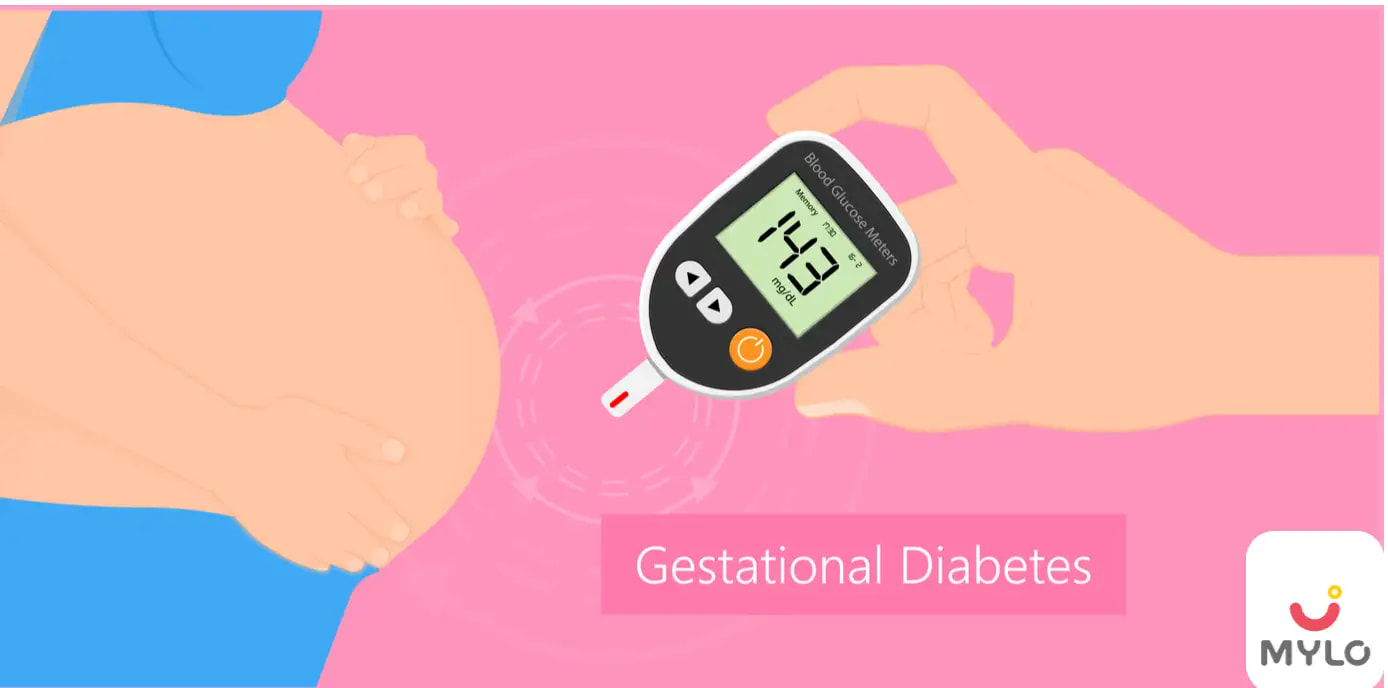Home

Diabetes during Pregnancy

Gestational Diabetes: Symptoms, Diagnosis & Treatment
In this Article

Diabetes during Pregnancy
Gestational Diabetes: Symptoms, Diagnosis & Treatment
Updated on 7 March 2024
No sweets for two! This a gentle reminder to all mothers-to-be that you may have high blood sugar levels during pregnancy. Read on to know why!
Overview
Gestational (during pregnancy) diabetes mellitus (high blood sugar levels) is a hormonal disorder causing insulin resistance and high blood sugar levels during pregnancy. It is more often seen in:
- Pregnant women above 25 years of age
- Previous history of >4.5kg baby birth
- Pre-pregnancy incidence of high blood sugar levels
- Lack of physical exercise
- Overweight or obesity
- Polycystic ovarian disease
- Asian and American races
The foetus may or may not get affected by gestational diabetes as it has its own insulin to counteract excess sugar from the mother's blood. During delivery, some babies may continue to produce more insulin and return to normal levels a few hours or days later. However, some may need to be administered glucose to balance the insulin levels. Treatment is targeted towards managing blood sugar levels and regular monitoring until 1-2 years post delivery.
Gestational Diabetes Symptoms
Gestational diabetes during pregnancy does not show any major symptoms. However, it may manifest itself in the following ways:
- Increased thirst and dehydration
- Increased frequency of urination, especially at night
- Some pregnant women may feel hungrier than usual.
If you experience any such symptoms during your pregnancy, inform your gynaecologist or physician immediately.
Gestational Diabetes Diagnosis
- All pregnant women, especially those at risk of gestational diabetes, must undergo a primary check-up in the first trimester of pregnancy to rule out high blood sugar levels as a precautionary measure. You may never be aware of it unless symptoms develop later on or during routine pregnancy tests and scans.
- Diagnosis may also be made when a pregnant woman shows signs and symptoms of gestational diabetes mellitus. A blood sample is collected to determine blood sugar levels.
- The growth of the baby is monitored through ultrasonography.
- A glucose tolerance test or gestational diabetes test may also be conducted to analyse how your body reacts to a sudden sugar rush within a time frame. Here, you will be given a glucose-rich sweet drink and a blood test will be done an hour later to determine how much sugar is left in the blood. It will also help your doctor know if insulin is present in appropriate amounts in your body.
Gestational Diabetes Sugar Levels Chart
| Sr. No | Scenario | Values in mg/dL |
| 1. | Before a meal | 95 or less |
| 2. | 1 hour after a meal | 140 or less |
| 3. | 2 hours after a meal | 120 or less |
Gestational Diabetes Treatment
Treatment is aimed at controlling blood sugar levels along with blood pressure with safe medications and insulin shots as needed. You will have to undergo regular check ups during pregnancy as well as after delivery. The baby may be administered glucose at birth if found to be in distress.
Other important things to consider:
- Regular exercise to promote insulin sensitivity and reduce the accumulation of fats due to excess glucose; exercising in the form of antenatal yoga, breathing exercises, and simple walking for a minimum of 20-30 minutes are advisable.
- Nutritious diet: It is advisable to have smaller, more frequent meals (2-3 times a day with intermittent snacks) to minimise sudden sugar rush with heavy meals.
Here is a list of foods to eat to counter gestational diabetes:
- Natural, low sugar content, like fruits and raisins, are recommended more than sugar-based biscuits, candies, and cakes.
- One must include more fibre in the diet in the form of vegetables and whole grains.
- Saturated fats in fried foods must be avoided.
- Maintain good hydration levels to prevent dehydration and undue fatigue.
Prevention of Gestational Diabetes Mellitus
You can prevent the occurrence of diabetes during pregnancy by following a few simple steps:
- Plan your pregnancy in advance and prepare accordingly.
- Start with regular exercises like walking, cycling, swimming, or any fitness activity of your choice.
- Maintain a healthy lifestyle with a nutritious diet and fluids.
- Practise breathing techniques to maintain body homeostasis (regular functioning of the body).
Complications of Gestational Diabetes Mellitus During Pregnancy
- Women may continue to have high blood sugar levels and suffer from type 2 diabetes mellitus post delivery. You may need to continue medications and insulin administration for some time.
- Babies born to women with gestational diabetes mellitus are at a higher risk of developing type 2 diabetes at a later age with more significant symptoms.
- You may also have high blood pressure along with gestational diabetes during pregnancy known as preeclampsia. High sugar levels increase the flow and pressure of blood. Medicines will be started to control blood pressure levels.
- One may suffer from jaundice (yellow discolouration of the skin) during pregnancy or after delivery.
- The infant born may sometimes require glucose intravenously and close monitoring in an Intensive Care Unit (ICU) for a few days.
- The risk of obesity in mothers and children increases substantially due to the accumulation of excess fats in the body.
You can also adopt a healthier lifestyle during pregnancy with Mylo Pregnancy Care Routine which includes pregnancy yoga sessions, Garbha Sanskar sessions and consultation with gynecologists and health coaches. It can help you manage your weight trimester wise, reduce backache and leg swelling, boost energy levels and manage gestational diabetes and BP.
Bottom Line
Pregnancy is a sweet time to be cherished but sugar sweetness in your diet needs to be controlled during pregnancy to prevent gestational diabetes mellitus. High blood sugar levels during pregnancy occur due to an imbalance in pregnancy hormones. Minor symptoms, like increased thirst and urination, may be experienced.
A blood test and glucose tolerance test during the first trimester of pregnancy may confirm gestational diabetes mellitus. Regular monitoring and medicines may help overcome diabetes during and after delivery. The unborn foetus may or may not get affected. Women should maintain fitness, diet, and hydration before planning a pregnancy to prevent gestational diabetes mellitus.
References
- CDC. (2021). Gestational Diabetes.
- American Diabetes Association. Gestational Diabetes



Written by
Priyanka Verma
Priyanka is an experienced editor & content writer with great attention to detail. Mother to an 11-year-old, she's a ski
Read MoreGet baby's diet chart, and growth tips

Related Articles
RECENTLY PUBLISHED ARTICLES
our most recent articles

Why You Should Consider Drinking Coconut Water During Pregnancy?

Allergies
Sneezing During Pregnancy: Causes, Risks and Treatment

Comfort vs. Style: The Pros and Cons of Wearing Heels During Pregnancy

Food Cravings
A Mom-to-Be's Handbook to Safely Savoring Momos in Pregnancy

Diet & Nutrition
Chicken During Pregnancy: The Ultimate Guide to Safe and Nutritious Eating

Diet & Nutrition
How To Prepare Food For Your Infant/Toddler Safely? Here Are Some Tips That You Must Not Forget While Preparing Food
- Lactational Amenorrhea Method: A Safe and Effective Contraception for Postpartum Moms
- What to Do to Help Fall Asleep Faster During Pregnancy?
- Home Remedies to Control High Blood Pressure in Pregnancy
- Pizza During Pregnancy: Cravings, Comfort, and Caution for Moms-To-Be
- Baby Milestones for Development, Growth & Health in the First Year
- The Ultimate Collection of International Women's Day Quotes
- The A-Z Guide to Identifying Vegetables Name in English for Children
- Grapes in Pregnancy: The Ultimate Guide to Benefits & Precautions
- Postpartum Exercise: What to Know About Exercising After Pregnancy
- Baby Crawling: A Parent's Guide to Baby's First Moves
- Postpartum Diet Plan: Your Postpartum Nutrition Guide
- The Ultimate Guide to Crafting the Perfect Baby Photoshoot
- Lupride Injection: How It Works and What You Need to Know
- Why are Some Women Recommended HCG Injection During Pregnancy?


AWARDS AND RECOGNITION

Mylo wins Forbes D2C Disruptor award

Mylo wins The Economic Times Promising Brands 2022
AS SEEN IN

- Mylo Care: Effective and science-backed personal care and wellness solutions for a joyful you.
- Mylo Baby: Science-backed, gentle and effective personal care & hygiene range for your little one.
- Mylo Community: Trusted and empathetic community of 10mn+ parents and experts.
Product Categories
baby carrier | baby soap | baby wipes | stretch marks cream | baby cream | baby shampoo | baby massage oil | baby hair oil | stretch marks oil | baby body wash | baby powder | baby lotion | diaper rash cream | newborn diapers | teether | baby kajal | baby diapers | cloth diapers |








